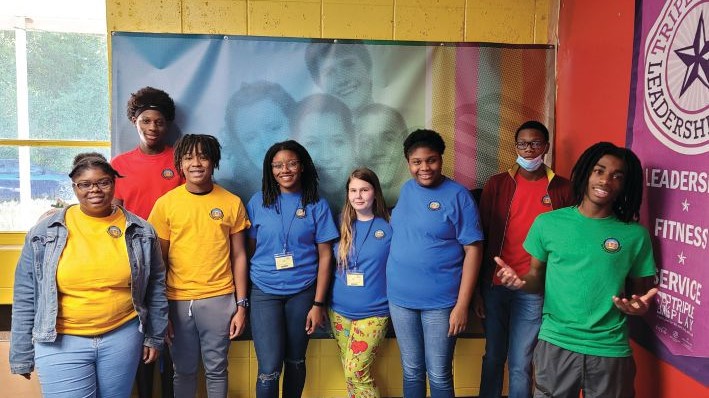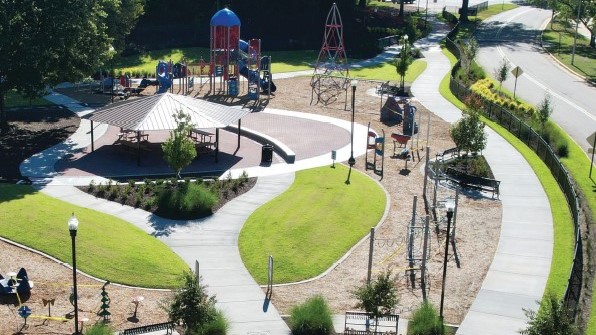
MEAG Power, Participant & Public Power News
Spring 2023
Three Participants Named 2023 Visionary Cities by the GMA and Georgia Trend
Camilla, LaGrange and Norcross were among the nine cities recognized in January by the Georgia Municipal Association (GMA) and Georgia Trend in the fourth annual Visionary Cities Awards for projects that create positive change through collaboration and civic engagement.
Previous Participant Visionary City winners include Acworth, Covington, Lawrenceville and Moultrie in 2022, Douglas and Griffin in 2021, and Adel, Hogansville, Marietta and Thomasville in 2020.
“GMA is thrilled to once again partner with Georgia Trend to recognize this dynamic group of elected officials, city staff and community leaders responsible for their unique and visionary approaches to bettering their communities,” said GMA Executive Director Larry Hanson. “These cities illustrate how serving and connecting their residents through innovative developments and programming can create positive change throughout Georgia.”
The Visionary Cities are grouped by population: Large (more than 25,000), Medium (5,000 to 24,999) and Small (fewer than 4,999). LaGrange represents the Large category among Visionary Cities, while Camilla and Norcross earned their designations in the Medium category.
Following are details of the civic projects and initiatives that helped each Participant earn the Visionary City designation. Reprinted with permission from Georgia Trend.

Camilla
As it emerged from the COVID pandemic, Camilla’s elected leadership saw a need to invest in the economic future and leadership development of the city’s youth. The result was the Camilla Youth Initiative (CYI), a three-pronged program that offers high school students paying jobs at nonprofit agencies, internships in city offices and a chance to learn first-hand how municipal government functions.
All of this might have been a good idea that the city could not afford, if it were not for ARPA’s federal COVID relief funding. Camilla Mayor Kelvin Owens said the city combined part of its ARPA grant with economic development funds from its own coffers to finance CYI, which has an estimated cost of $200,000 a year.
The Camilla Youth Council forms one element of the program. Elected officials, educators and a school resource officer appoint students to this advisory board, which observes the Camilla City Council and provides feedback on issues of special interest to young people.
Another program element provides meaningful work experience – and $10 to $11 an hour – to participants ages 14 to 19 by funding part-time jobs at nonprofits that partner with the CYI. The Mitchell County School System and the Mitchell County Boys and Girls Club pitched in on this aspect. “The program is designed for these teenagers to work for nonprofits only, so they are not only getting a paycheck, but they are serving the community,” says Owens. The goal for the program launched last fall is to provide a rotation of six months of employment to 16 to 20 students at a time.
Rounding out the CYI is a program that rotates students into internships in various city departments, including the city manager’s office, human resources and public works, to provide experience directly linked to workforce needs.

Norcross
Bees and other pollinators are finding Norcross to be a friendlier place these days, thanks to the Pollinate Norcross campaign. City parks, schoolyards, power easements, even the grounds of Norcross City Hall are being planted with native plants, flowers and shrubs designed to attract pollinators.
Every schoolchild and all adults who follow the news know that pollinators are in trouble, their numbers declining due to development, pesticides and other factors. The city of Norcross decided to do something about the problem in a program that turned out to be low-cost and appealing to a wide swath of the citizenry. The city was designated a Bee City in 2018, part of a national program to promote bee-friendly practices, and Pollinate Norcross grew from there.
“Sustainability and environmental stewardship are cornerstones to the City of Norcross and our continued prosperity. Our goal is to help embed sustainability into the routine practices and procedures of the city as a driver for economic development, cost efficiencies and community health and engagement,” says Norcross Mayor Craig Newton.
In 2021-2022, the program reached nearly 800 residents through school garden groups, after-school programs, community workshops, employee education and community volunteer events. Costs have been modest: approximately $7,000 from the city’s budget and an additional $1,000 in sponsored plants and materials.
The Bee City Committee, the champion of the project, was able to build a relationship with Norcross Elementary and Summerour Middle schools since its goals meshed with the curriculum. Workshops that involved local businesses upped the awareness of the program and created a snowball effect. Master gardeners and garden clubs volunteer time and expertise, as well.

LaGrange
LaGrange is one of those cities that fully grasps the potential public parks hold for community-building, civic engagement and branding. Commitment to its parks was part of the rationale behind the city’s decision to take back capital funding and maintenance of the park system from Troup County in 2021.
“The city felt it was time to take those parks back, breathe new life into them, do renovation projects and potentially some new capital projects,” says Meg Kelsey, LaGrange city manager. “Parks are quality-of-life amenities that attract people to come and live in LaGrange, and for current residents. We want them to have products to enjoy.”
In 2021, the city hired a new parks director and additional staff to help maintain the city’s 15 parks (just over 119 acres combined). That’s important to park-rich LaGrange, where the goal is to link every city park to The Thread, a linear park master-planned to encompass more than 29 miles when completed.
“We want to bring all the parks together and tie our community together so all the neighborhoods in the city can be linked by this amenity,” Kelsey says.
LaGrange uses multiple revenue streams to finance its parks, including the general fund and a dedicated line item in the budget. Many capital improvements are funded by a special-purpose local-option sales tax (SPLOST). The city leveraged American Rescue Plan Act (ARPA) funds to build newly opened Moss and Wood Park, and Kelsey recently submitted a grant application seeking funds for a bike playground the city hopes to build across from a city elementary school.
The next big park project, Ridley Lake, will combine $3 million from a Georgia Outdoor Stewardship Grant and $3 million in city funding. “We think it will be a regional draw for people from other areas to fish, kayak, paddleboard and just enjoy the outdoors,” Kelsey says.
Quick Links:
Meetings & Events
Other Resources
Current is published by MEAG Power
1470 Riveredge Parkway, N.W., Atlanta, Georgia 30328 | www.meagpower.org | (800) 333-MEAG